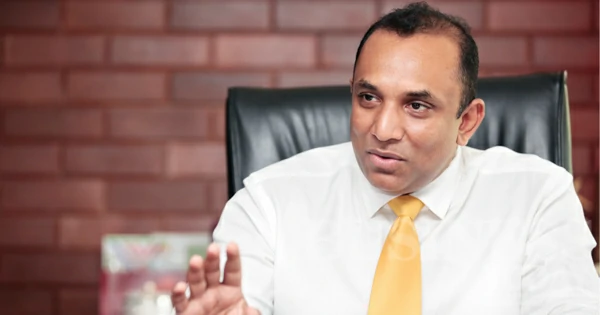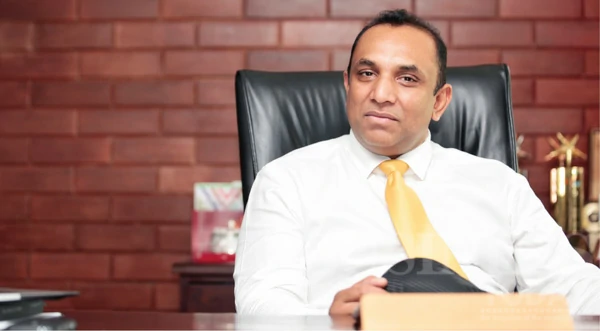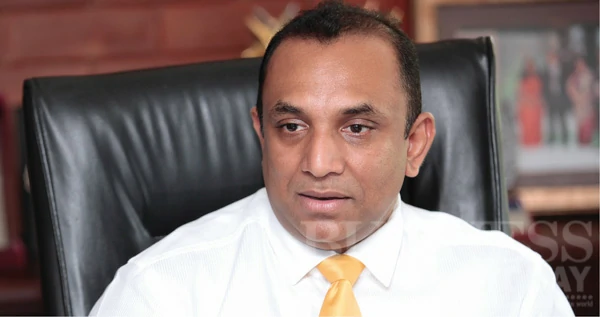
JF Packaging is one of the pioneering industries in the packaging sector of the country and focuses on providing unique integrated flexible packaging solutions and product development. Lakshman De Fonseka, Chairman and Managing Director of the company, proudly talks about the success and growth of the company, which was initially founded by his father Joseph De Fonseka, as a humble initiative to provide employment to the people of Pallekele and a stable future for the youth who were affected by the 1987 insurgency.
By Archna Balakumar
Photography Indika De Silva
We have already spoken to you in 2012, could you tell us how the company has progressed since then?
I believe when we spoke last, JF had just initiated an expansion process. It was about three years ago, and at that time we were doing business worth around 715 million rupees per annum, which has now increased to 1.5 billion rupees. In the last two to three years, the company has grown to become almost double of what it was. We are proud to say we were also considered as the main suppliers for Nestlé in 2014, and they elevated us to their global supply chain. I am proud yet humbled to say that was a huge achievement by the JF team. Unlike our competitors, our company was not backed by big corporates and we did not have other financial backing back then. Yet, we have made it possible to reach new heights and it is an encouraging recognition for a Sri Lankan company.
What are the services and products offered by JF Packaging?
JF Packaging mainly provides solutions for high barrier flexible packaging requirements that our current market needs. At present, most of the FMCG (fast moving consumer goods) companies are going for smaller sachets. Various kinds of fast food and biscuit industries have already gone for high barrier flexible packaging. Therefore, the services that we currently provide are focused along those lines and our clientele include big players. We supply to most of the industries and whatever you pick up at a supermarket today, the flexible packaging of it is probably manufactured by us, thereby making us the first contact point for all consumers.
The company also has a product development and designing sector, Could you elaborate on them?
Product development happened with the changes in the industries. For example, most of the tea companies are now using individual packaging such as sachets and packages of convenient sizes as consumer preferences and buying power has contributed to the need of small packaging. It is extremely demanding to supply packaging material according to the minor and precision details requested by our customers. This technology was not available with us earlier and now that we have the ability to provide such an option, we have put in much focus on such product lines. Right now, we are spending a substantial amount on product development. We send our people for training and development, both overseas and locally, and we also educate on current trends.
“JF Packaging Will Be One Of The Largest Companies In The Packaging Sector Having The Total Cross Section Of Packaging Solutions Under One Roof.”
Product development has become an essential aspect to any business to prosper because the consumer is extremely demanding. As an example Coca-Cola has gone to a level of personalised branding for consumers. Flexible packaging is the first contact point for any brand. Moreover, the Brand Managers have become extremely demanding. To cater to that, we have to keep investing on new technology and keep our selves up to date.
If you do not change your thinking according to how the world moves, then you will always be five years behind. Therefore, we are currently planning on proceeding with a couple of new investments this year as well. We are ready to commence those investment portfolios in production, these technologies will be pioneering in Sri Lanka. JF packaging will be one of the largest companies in the packaging sector having the total cross section of packaging solutions under one roof. With such new ventures at hand, within the next five years we want to turn the company into a ten billion rupee organisation per annum.
How important is innovation and technology in the packaging industry?
Without innovation, the entire world would stop running at one point. It will stagnate, which is why innovation is a major part of our industry. We are in a high-tech era that changes with consumer power. A good example for this is the former global communications giant ‘Nokia’. They were so huge, that the gap between them and their competitors were vast. Even when Google offered the Android platform to Nokia they refused. The management was ignorant and arrogant towards the changes of the market. That boardroom decision finally killed Nokia. Thereafter, Nokia seemed to be lagging in the race. Samsung entered the race from nowhere and focused on ‘innovation’ as it’s core competence to gain the market share and unfortunately Nokia was too late to realise this fact. The problem with Nokia, seems similar to those of many large companies such as Microsoft or Sony, who could not develop high quality innovative products fast enough to match their rising competitors. As the companies grew larger and richer, each department became its own kingdom, each executive a little emperor, and people were more concerned about their status and internal promotion than cooperating actively with other departments to produce innovative products rapidly. This phenomenon is also known as silo politics, and spread naturally and quickly like bad weeds in a garden.
It is obvious that if a company is missing constant innovation, the company has a higher probability of getting punished by it’s customer. The same applies to the packaging industry. When we look at it now, the industry has changed tremendously from what it was five years ago. It has progressed so much and the requirements and challenges have varied largely. For instance, earlier there were printing machines that had the ability to produce two to four colours per print but today the standard norm is between eight to twelve colours.
“The Strongest Success Factor Of JF Packaging Is Undoubtedly, Human Resources. In The Industry, I Believe JF Has The Best Human Resource.”
Multinationals like Unilever, Nestlé and Prima has given us the opportunity to innovate in placing their trust in us to give them innovative packaging solutions. They have educated us with their global know-how when they could have easily sourced it from overseas. We even won a Gold award at Lanka Star 2014 under the innovations category and we also won the Most Innovative Packing Supplier by Unilever SL in 2014. Their innovative requirements have made us stronger. I would also like to appreciate our long standing local customers such as MDK, Highland and Keells who have been working with us for more than 20 odd years and have done many developments with us.
These advances will keep taking place with the progression in technology. Computers and graphics have given an innovative space for everyone and brand managers have become very particular about their products. It’s obvious that we won’t be able to survive in the current market if we don’t experiment with new innovation and technologies. I am proud to say that JF Packaging is the market leader in the flexible line and we have achieved this status, through various innovations and the faith and trust that our customers have placed in us. Our customers believe that we are strong and capable to carry out these innovations for them.
What is the scope of the packaging industry in Sri Lanka?
When I ventured into the business, I was the third player to come into the Sri Lankan flexible packaging industry. Today there are about 32 companies in the flexible packaging industry with various scales of business. However, only four have reached the billion rupee turnover range.
Further, we don’t just focus on flexible packaging solutions; we provide them with a total spectrum from how to bring out a product to how it needs to be packed to the equipment they should utilise. With our 28 years of experience in this field, we are in a position to advice the new entrepreneurs who are entering into food or various FMCG product lines that require flexible packaging.
How challenging is it to be Eco-friendly in the packaging industry and how is JF Packaging fairing?
Earlier, flexible packaging industries were using heavy gauge materials when they could have met the same product specifications with a lesser quantity. As such, there was considerable wastage. Now, we have educated other industries about the advantages of using lesser gauge material and have essentially helped the environment by providing such an innovative approach. Generally, there is a misconception about polymer packaging as it is considered to be harmful to the environment. I do not agree with that. It has to be understood that the polymer resin is a by-product of fossils and there are no separate energy inputs involved in the production process. So if we use this material and dispose it in a responsible manner, just like how they do in the West or Europe, then it will not pose a problem for the environment, rather it would be an advantage. Moreover polymers can be recycled.
In our case, all our waste goes to a cement manufacturing company where they use it as a fuel for their ‘Cement Kiln’. So practically, it’s a huge benefit when industries are integrated in such a manner. On the other hand, the manufacturing process of paper is energy intensive and causes huge problems. Hundreds of trees are cut to obtain paper pulp, which ultimately leads to global warming. Therefore logically, it’s our attitude and responsibility towards handling wastage and materials that make us more environmentally conscious.
What is the strongest aspect of the company that is responsible for its success?
The strongest success factor of JF Packaging is undoubtedly, human resources. In the industry, I believe JF has the best human resource. Our employees know what they are doing, because we have trained them and the training that we get from Multinationals such as Unilever, Nestlé and Prima (CAIL) has given us the opportunity to groom our employees to more professional levels. We don’t have Machine Operators, we have Production Technicians. Even our designations give them the chance to maintain a status quo in the society thereby creating a happy workforce. From the moment they enter the premises they are responsible and that is exactly what our clientele requires. And further our employees are always loyal to the organisation. On an average, most of our employees have been working here for more than ten to 12 years. Some of them have been with us since the inception of the industry. We can bring the best equipment from Europe paying millions of dollars, but if the person behind that equipment is not motivated and if he doesn’t believe in what he is doing then we will not be able to obtain a good product.
“We Hope To Achieve More Than What We Have Achieved In The Past 20 Odd Years. Within The Next Five Years We Are Going To Make JF A Ten Billion Per Annum Company.”
We have a unique system here at JF Packaging. We don’t treat the staff as employees, but as members of the JF family. By doing so we have given them the security and ownership to this company. When an employee starts working with us, as far as JF is concerned, we take complete responsibility for the person including his/her family. In case of a death of one of our employees, due to accident or sickness, we give salaries to the families until the children come of age and can support themselves and the family. Even at this moment we are practicing this. It doesn’t matter if the person has been with us for five years or just a day. Therefore, our thinking is completely different. We have seen companies spending millions of rupees on CSR projects and charity, but what they really should be doing is turning inwards and looking after the people within the company. That’s my concept. And I feel that this is the success of JF.
How is the tie-up with Lankem affecting JF packaging?
It took me nearly 28 years to bring JF to what it is today and I believe our tie up with Lankem will largely benefit our expansion plans. Our collective vision is to make the company ten times bigger within the next five years. I believe together with Lankem, we hope to achieve more than what we have achieved in the past 20 odd years. That is why I mentioned earlier that within the next five years we are going to make JF a ten billion per annum company. And, I am very happy about our alliance. Our relationship with Lankem has strengthened JF and we can venture into new investments with this successful partnership.
Could you tell us about yourself and how your diverse background and experience have helped you in business?
I studied at Trinity College in Kandy and my school has guided me to be who I am today. I spent most of my early days in the school hostel and the experience I gained there made me tougher and capable of facing any situation. Also my father, Joseph De Fonseka has helped me immensely. He was a very tough and disciplined man with a no nonsense attitude. And I don’t think that you will believe me when I say that, even if I was talking to him over the phone, I used to stand up and talk to him. And my friends used to tease me about that. He taught us to value and respect people around us not for their positions, but for their integrity. Now when I look back, I think of what an amazing man he was. It was very challenging after his demise. Another motto that I believe is; before going to sleep, if your conscious is clear and judgements fair and if you feel for others, most of the problems will solve on its own.
Final thoughts?
Sri Lanka has a new government now, and many things will be better in the future. I hope we have more people like Hon Mr Lakshman Kadiragamar. I always adored and respected this gentleman because he was a member of society who was above race, religion and community. He was a good human being that anybody could approach. I hope our politicians get inspired by such a personality, and not practice race or religion oriented politics, but instead be a good politician to all Sri Lankans. I will refrain from mentioning about current leaders as then I am automatically trading into their political parties. Therefore, I will only comment about leaders who are no longer with us. I respect the former Presidents Hon Ranasinghe Premadasa, Hon Gamini Dissanayake and Hon Sirimavo Bandaranaike who led this country effectively during difficult times. I hope the country is led by more such politicians.







